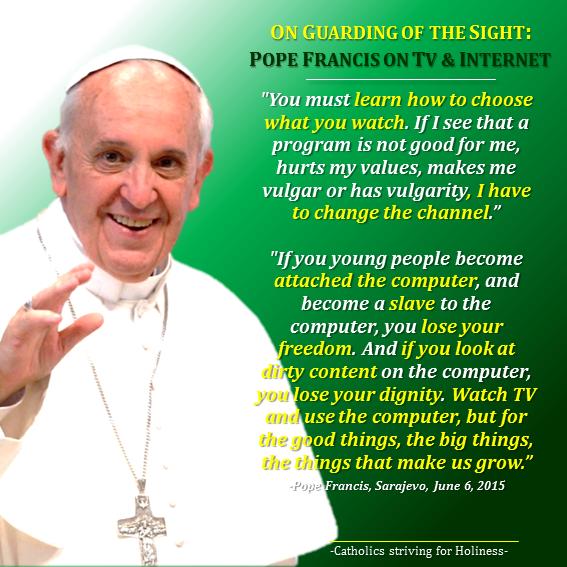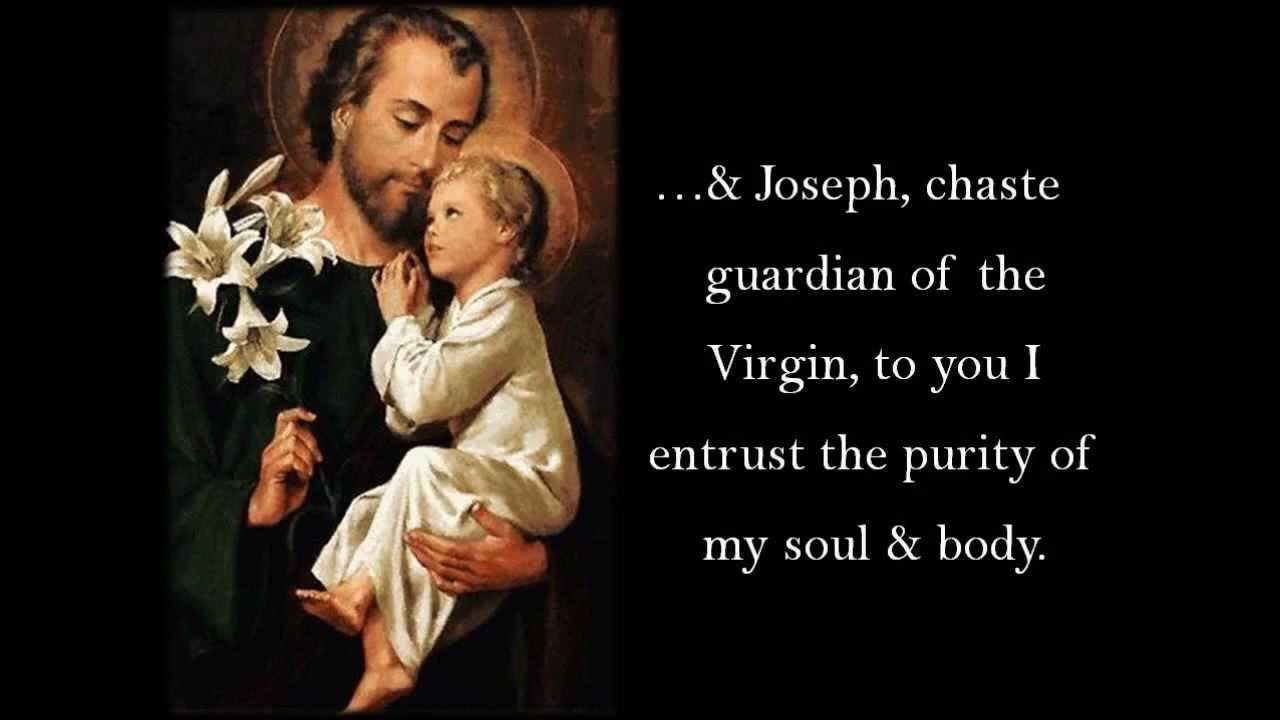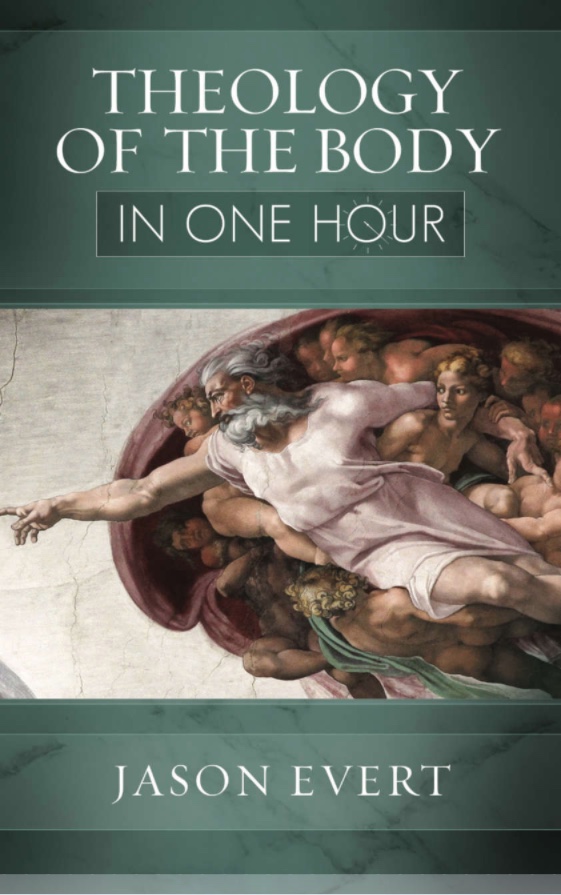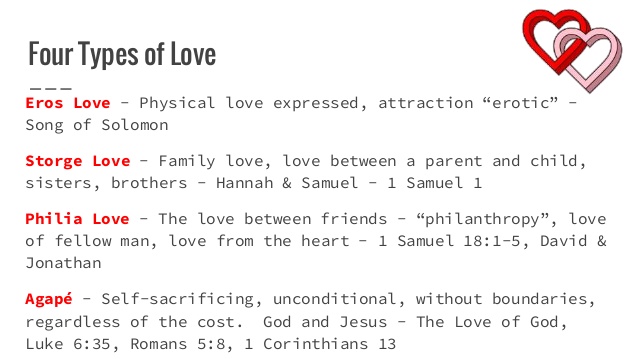“Nothing is in the intellect that was not first in the senses.” Peripatetic axiom, St Thomas Aquinas, OP, De veritate, q. 2 a. 3 arg. 19.
In Roman Catholic teaching, “occasions of sin” are “external circumstances–whether of things or persons–which either because of their special nature or because of the frailty common to humanity or peculiar to some individual, incite or entice one to sin.”
In confession, a refusal on the part of a penitent to avoid a voluntary occasion of sin would make it imperative for the confessor to deny absolution. It is not always necessary for the confessor to await the actual performance of this duty before giving absolution; he may be content with a sincere promise, which is the minimum to be required.
“O Lord, guard my senses, so that I may never be separated from You. With Your help, I will keep a vigilant watch over the doors of my soul, and apply myself more fervently to a perfect observance of the rules of modesty which apply to my state in life. I will make the spirit of mortification the guardian of my senses, exercising myself in not wishing to see, hear, or discuss anything but what is required for the fulfillment of my duties. “But if You, O Lord, do not keep my house, I shall watch it in vain” (cf. Ps 127); therefore, with my whole heart I beg You to restrain and moderate my tongue, guard my eyes so that they will not be fed by vanity. “Lord God, King of heaven and earth, deign to direct and sanctify, rule and govern my heart, my body, my thoughts, words, and deeds in Your law and in the works of Your commandments, so that now and forever, by Your help, I may attain salvation and freedom from all evil” (old Roman Breviary).
“Do not permit my senses to go astray, but do You Yourself deign to call them back to You, like the good shepherd who, with his flute, calls his sheep dispersed in the valley. You, more than any other shepherd, have a call so sweet and so powerful that the senses, as soon as they hear it, cannot resist, and quickly come back into the sanctuary of the soul where You await them and to which You call them. O loving Shepherd of my soul, do not refuse to show me this mercy, so necessary for my weakness” (cf. Teresa of Jesus, Interior Castle [also known as The Mansions] IV, 3).
“Turn away my eyes from beholding vanity—quicken me in Your way” (Psalm 119:37).
“Unless we turn away our eyes from vanity, we shall soon contract a deadness of heart. When our affections are alive to worldly things, they are dead to God. Therefore the less we let loose our hearts to these things—the more lively and cheerful the work of obedience. On the other side, the more the vigor of grace is renewed, and the habits of it quickened into actual exercise, the more is sin mortified and subdued.
It therefore concerns those that would walk with God to have their eyes turned away from worldly things. He who would be quickened, carried out with life and vigor in the ways of God, must first be mortified, die unto sin. Speaking of the fruits of Christ’s death, the Apostle mentioned death unto sin—before life unto righteousness (1 Peter 2:25). If any would live with Christ—first they must learn to die unto sin. It is impossible for sin and grace to thrive in the same subject.
One great means of mortification is guarding the senses, eyes and ears, taste and touch, that they may not betray the heart into sin. I put it so general, because the man of God who is so solicitous about his eyes would not be careless of his ears and other senses. We must watch on all sides. When an assault is made on a city, if one gate is open, it is as good as if all were. The inlet and outlet of sin is by the senses, and much of our danger lies there. There are many objects that agree with our dispositions, and by them insinuate themselves into the soul, and therefore things long since seemingly dead will soon revive again and recover life and strength. There are no means to keep the heart, unless we keep the eye. In every creature Satan has laid a snare for us, to steal away our hearts and affections from God. The senses are so ready to receive these objects from without to wound the heart, for they are as the heart is. If the heart is poisoned with sin, and became a servant to it, so are the senses of our bodies “weapons of unrighteousness” (Romans 6:13). Earthly objects have an impression upon them answerable to the temper and affections of the soul—and what the soul desires—the senses pitch upon; and therefore if we let the senses wander, the heart will take fire.
Above all senses, the eye must be guarded. First, because it is the noblest sense, given us for high uses. There is not only a natural eye to inform us of things profitable and hurtful for the natural man—but a spiritual use to set before us those objects which may stir us and raise our minds to heavenly meditations. By beholding the perfection of the creature, we may admire the more eminent perfection of Him that made them: “the heavens declare the glory of God, and the firmament shows His handiwork” (Psalm 19:1). “For since the creation of the world God’s invisible qualities, his eternal power and divine nature, have been clearly seen, being understood from what has been made” (Romans 1:20). The perfections of the creature are to draw us to God—and its defects to drive us from themselves. The eye, as it is used, will either be a help or a snare: either it will let in the sparks of temptation, or enkindle the fire of true devotion. These are the windows which God has placed in the top of the building, that man from there may contemplate God’s works and take a prospect of Heaven.
Second, because the eyes have a great influence upon the heart either to good or evil—but chiefly to evil. In this corrupt state of man, by looking, we come to liking, and are brought inordinately to love what we behold. “Seek not after your own heart and your own eyes, after which you used to go a whoring” (Num. 15:39). “If my step has turned out of the way, and my heart walk after my eyes” (Job 31:7). These are the spies of the heart, agents to bring it and the temptation together; the eye sees, and then by gazing, the heart lusts, and the body acts the transgression. It is more dangerous to see evil, than to hear it.” (-Thomas Manton, 1660)
Prayer to Spend the Day Well
-Bl James Alberione
Dear and sweet mother Mary,
keep your holy hand upon me;
guard my mind,
my heart and my senses,
that I may never commit sin.
Sanctify my thoughts,
affections,
words and actions,
so that I may please you and your Jesus, my God,
and reach heaven with you.
Jesus and Mary,
give me your holy blessing;
In the name of the Father,
and of the Son, and of the Holy Spirit. Amen.
Love,
Matthew








